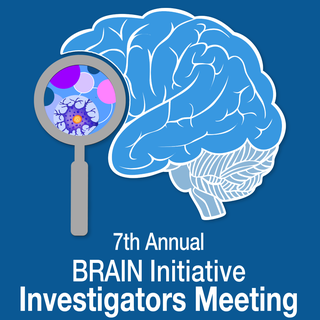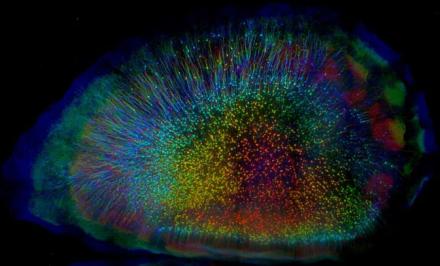From June 15-17, NIH will host the seventh annual Brain Research through Advancing Innovative Neurotechnologies® (BRAIN) Initiative Investigators Meeting, with an exciting all-virtual format. The meeting, which is open to the public, follows last year’s successful all-virtual meeting, which included over 4,400 registered attendees. One silver lining from the COVID-19 pandemic has been the engagement of a larger, far-reaching neuroscience community in the NIH BRAIN Initiative, and I am eager to see this community come together to share their progress and ideas. The meeting is open to the public and free to attend, so please register here, and join the 2,500 participants (and counting!) who have already signed up. We all await a time when in-person gatherings at scientific conferences and meetings will be safe again. Until then, our scientific community has found that virtual meetings can enable stimulating conversations, generate buzz around new scientific results, and forge contacts for new collaborations.

This year’s meeting program includes plenary talks from Nobel Laureate, Dr. Jennifer Doudna (University of California, Berkeley) on the ethical implications of gene editing, and Dr. Erich Jarvis (The Rockefeller University) on June 15; from Dr. Ed Lein (Allen Institute for Brain Science) and Dr. Mala Murthy (Princeton University) on June 16; and from Dr. Danielle Bassett (University of Pennsylvania) on June 17. In addition, attendee-organized symposia will feature emerging focus areas for the BRAIN Initiative. Some of these topics will include: Engineering Receptors for the Precision Control of Neural Networks; Olfaction: From Sensation to Behavior; and Diversity of the Social Brain. Along with these symposia, Research Highlight and Trainee Highlight Talks will provide platforms for BRAIN Initiative scientists at earlier career stages to present their latest advances. Finally, we will be announcing the winners of the Show Us Your BRAINs! Photo & Video Contest, an effort in its third year for the BRAIN community to showcase eye-catching image and video entries, some using technologies they developed with BRAIN Initiative support. Check out last year’s winners below!

Mouse Layer V cortical neurons eYFP-labeled (Thy1-H) and imaged after CLARITY processing of a whole brain. Maximum projection with depth color coding. By Linus Manubens-Gil and Jim Swoger, Centre de Regulació Genòmica (CRG) and EMBL Mesoscopic Imaging Facility
This year’s meeting also underscores ongoing actions to promote diversity, equity and inclusion (DEI) within the BRAIN Initiative community (please also see a recent message from BRAIN Director Dr. John Ngai on this topic). The meeting’s poster session includes a category specific to DEI strategies and practices, and posters in all categories can include a DEI icon or use keywords to note DEI efforts in the presenting research. On June 16, a symposium will focus on, “Achieving Diversity, Equity and Inclusion in Neuroscience Research in Under-Served, Under-Resourced and Remote Settings.” Further, on June 17, Dr. John Ngai and Dr. Elba Serrano (New Mexico State University) will moderate a plenary dialogue about DEI, providing a forum for attendees to learn about resources to support and contribute to DEI in their scientific and everyday lives. Finally, a chat room focused on DEI topics will allow discussion and offer additional questions for attendees to consider each day.
Neuroscience advances don’t happen in a vacuum: their impacts extend beyond the research community, and so communication, engagement, and outreach with broader audiences are critical. To that end, the meeting includes a science communications workshop with Jamie Talan, MPH, a prominent national science writer who has focused on brain research for the past 40 years. Meeting attendees can also learn about outreach strategies (particularly those targeting high school students) at a session entitled, “Engaging the Next Generation in STEM.” Since its inception, the NIH BRAIN Initiative has integrated a focus on neuroethics into its research activities, and leading up to this year’s meeting, a special neuroethics session today will consider, “Perspectives on the complexities of improving neuroethics engagement among writers, neuroethicists, and scientists in academia and industry,” through small-group discussions.
NIH, including the ten Institutes and Centers supporting The BRAIN Initiative®, is proud to host this free event. I especially applaud the program committee and staff who have been hard at work all year to plan a successful virtual meeting experience. For more information about the 2021 BRAIN Initiative Investigators Meeting, please visit the meeting website. Hope to e-see you there!
2020 FIRST PLACE VIDEO WINNER: Intact Whole-brain Imaging of Neurons
Thy1-GFP mouse brain optically cleared and imaged with the Zeiss Light-sheet Z.1 microscope using a Mesoscale Imaging System. By Sunil Gandhi, Ricardo Azevedo and Damian Wheeler, University of California, Irvine and Translucence Biosystems
